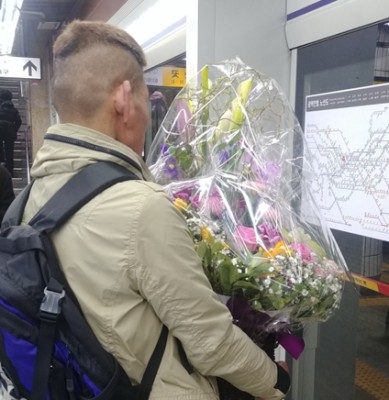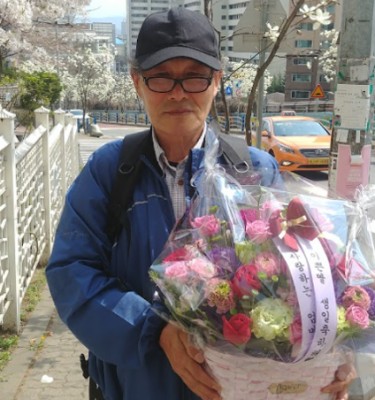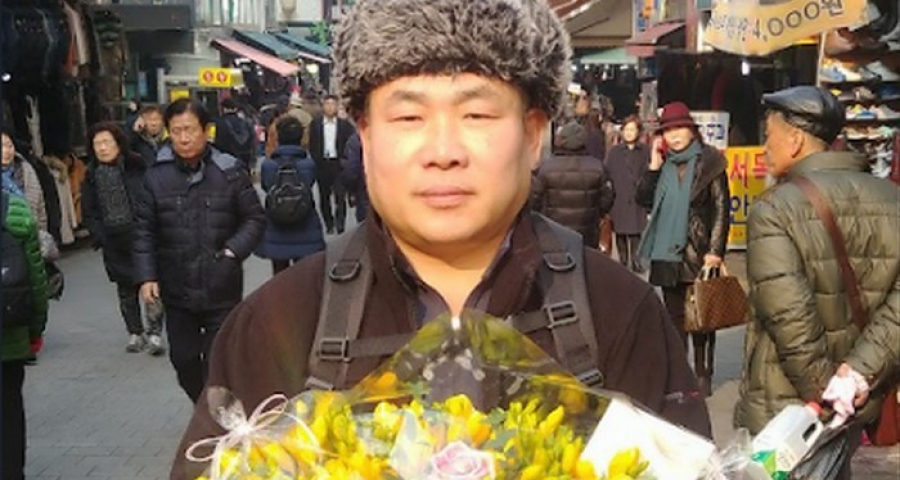Since January 2018, the ‘Good Neighbour Programme’ has been effectively providing employment opportunities for homeless people in the Southgate Market area of Seoul.
by Hyo Young Francesco Kang
In the ‘Good Neighbour Programme’, homeless people (the ‘Good Neighbours’) deliver flowers on behalf of about 15 flower shops in Seoul's Southgate Market. The programme is run by the Southgate Market Catholic Church, a parish whose social services include the ‘Woori Multuh’, literally ‘Our Well’, a facility where the homeless are allowed to hand-wash their clothes, have a shower and eat a simple meal. Opened in 2001, Our Well operates twice a week, serving about forty homeless people in the area.
The first ones to earn a small stipend by joining the flower delivery programme were some of the homeless people who used to frequent Our Well, but since 2023, some homeless people cared for at the Seoul Alcohol Addiction Treatment Centre have also joined the programme.
 When a Good Neighbour makes a flower delivery, the programme supplements the amount of the fee so that the person gets about twice as much as they would normally receive. Even when there are no requests for deliveries (e.g. during the off-season for flower shops), the programme pays Good Neighbours “waiting allowances” for the hours they spend waiting for orders, providing a minimum daily wage of about USD 20 per person. On a busy day, a Good Neighbour can earn about one hundred US Dollars through the programme.
When a Good Neighbour makes a flower delivery, the programme supplements the amount of the fee so that the person gets about twice as much as they would normally receive. Even when there are no requests for deliveries (e.g. during the off-season for flower shops), the programme pays Good Neighbours “waiting allowances” for the hours they spend waiting for orders, providing a minimum daily wage of about USD 20 per person. On a busy day, a Good Neighbour can earn about one hundred US Dollars through the programme.
Currently, there are ten Good Neighbours who, as self-employed workers, deliver flowers every day from Monday to Saturday. Another five Good Neighbours, having regained their self-confidence through flower delivery, have moved on to do other types of work, more profitable than flower delivery, such as cleaning the floors of flower shops, managing multiple dwellings consisting of small rooms, delivering credit cards and caring for elderly residents in old people's homes.
The programme encourages the homeless to work and become financially independent, enabling them to leave the streets and live in a small room in the city: it is therefore a form of social innovation that directly addresses the problem of homelessness and poverty through the creation of job opportunities.
The programme is supported by donations from around 30 individuals, companies and law firms, which are called ‘Loving Hands’. Among them, four major Korean law firms support the programme by regularly ordering flowers through the main flower shop in Southgate Market, which supports the programme; the latter also has made a small area available for the Good Neighbours to stay in while waiting to receive their delivery orders.
On balance, the programme successfully links and unites various entities in a network of ‘mutually beneficial’ mutual relationships: (I) the Good Neighbours, who make a personal commitment to become financially independent, thus gradually recovering their self-esteem, (ii) flower shops, which not only receive satisfactory delivery services, but also participate in the social cause of helping the homeless and people with alcohol problems, (iii) Loving Hands, which donate money to the programme to indirectly care for people in vulnerable situations, and (iv) the Parish and volunteers of the programme, who together address social problems in the community directly by creating employment opportunities.
Although evangelisation is not the main focus of the programme, it is worth noting that since the programme began, four Good Neighbours have been baptised in the Parish and are now leading a life of Christian faith.
Underlying the programme are the EoC values of ‘gratuitousness, giving, reciprocity, solidarity and spirituality’; the Good Neighbours, Flower Shops, Loving Hands, the Parish and the programme volunteers are all inspired to live these values through the programme – manifesting ‘Agape’ in concrete economic activities. Based on these values, the main objectives of the programme are articulated as follows:
the Good Neighbours, Flower Shops, Loving Hands, the Parish and the programme volunteers are all inspired to live these values through the programme – manifesting ‘Agape’ in concrete economic activities. Based on these values, the main objectives of the programme are articulated as follows:
- The programme provides the basis for a life of gratuitousness and giving for all participants.
- Financial support to the Good Neighbours is provided not as a form of altruism or philanthropy, but as a form of sharing in which each programme participant gives and receives with equal dignity in a reciprocal relationship.
- The Good Neighbours have a voice in the programme's decision-making processes, which results in participatory governance of the programme and solidarity between the Good Neighbours and other participants.
- All programme participants, acting in unison, achieve ‘communion’ - the highest degree of mutual openness and fraternity - and live their own lives in a way that respects others.
- The programme ends up manifesting God's spiritual existence through tangible economic activities, revealing the presence of the triune God in interpersonal relationships.
Plans are currently underway to expand the programme so that more Good Neighbours can earn a small stipend by delivering other items besides flowers, which are also sold in Seoul's Southgate Market. This is expected to enable more homeless and alcoholics to earn a living by starting a journey of self-rehabilitation. At the same time, new shop owners will participate in creating jobs for people in a vulnerable situation, more Loving Hands will engage in the act of donating to the community's social cause, and the number of volunteers living the values of the EoC will increase. It will be crucial to constantly monitor the programme to ensure that while it grows, it also continues to respect the EoC values of ‘Gratuity, Giving, Reciprocity, Solidarity and Spirituality’.








